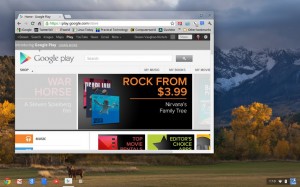Linus Torvalds likes the Google Chrome OS Linux desktop

Linus Torvalds, Linux's primary creator, hasn't been happy with the direction his formerly favorite Linux desktop interface, GNOME, has gone. In fact, Torvalds downright hates GNOME 3.x. He'll get no argument from me. I hate GNOME 3.x too. Recently though, Torvalds has start toying with Google's new Chrome operating system's Aura interface and, guess what, he kind of likes it.
Torvalds wrote, "And I haven't really played around with it all that much, but as a desktop it really doesn't look that bad. I could name worse desktops (cough cough)." That would be GNOME 3.x of course.
Torvalds continued, "It allows such radical notions as having easy mouse configurability for things like how to launch applications. Things gnome removed because those kinds of things were "too confusing", and in the process made useless. And an auto-hide application dock at the bottom. Revolutionary, I know."
Say hello to Google's new, old Chrome OS (gallery)
He added, "It also seems to improve on the experience even in the non-laptop mode. Making the calendar start as a "window" instead of as a browser tab also means that when you use it in the single-use mode that we traditionally did, the app takes up the whole screen, without the browser buttons etc."
"So the new Aura approach seems to work both as a traditional window manager and as a more limited "apps take up the whole screen". Maybe this whole 'browser as an app' thing can really work," Torvalds concluded.
In short, he found, as I have when I tested Chrome OS Aura, that Google has taken its hybrid Linux desktop/cloud-based and given it a really useful retro desktop look. Personally, I'll take this kind of desktop, or the Linux distribution's Mint new take on the GNOME 2 interface, Cinnamon over such new and improved desktop interfaces as GNOME 3.x or Windows 8 Metro any day of the week.
The current generation of Chromebooks though, which is where most people including Torvalds use Chrome OS, are another matter. Torvalds wrote, "The whole point of a laptop for me is that you can take it on the road and do your work. And that, to me, means "compile stuff and use git". And no, "use ssh [Secure Shell] in a browser to compile on some other machine" does not count. The laptop is the only thing I have with me. So for it to count as a real laptop, I need to be able to do real work locally too. I like having lots of connected options, but they can't be the only options."
Of course you don't need a Chromebook to run Chrome OS. You can run it on any PC. It's just that it's not packaged that way. In fact, I run Chrome OS in virtual machines all the time. Personally, though, my Samsung Series 5 Chromebook has become my grab and go laptop.
On the other hand, I just use Web applications like Gmail, Google Docs, and Google Voice on it. I don't try to use git, never-mind compile anything on it! For those uses, it would be great if, as it appears might be the case, the next generation of Chromebooks will be built on Intel's Ivy Bridge chips.
In the meantime though, as Torvalds said in a comment, "I was pleasantly surprised by the new interface - it seems to be going very much in the right direction. Give it a few years (and better hardware), and I can really see it happening. As it is, it's clearly useful for some people, judging by the comments here. It's not there for me now. But the new interface is better even just for the limited use I put the thing to."
Related Stories:
Google's new Chrome OS: Back to the future
New Chromebooks to get a much-needed Ivy Bridge speed boost?
Google wants you to buy a Chromebook: Should you? (Review)
How to install Google's Chrome OS
Five Reasons why Google's Linux Chromebook could be a Windows killer
